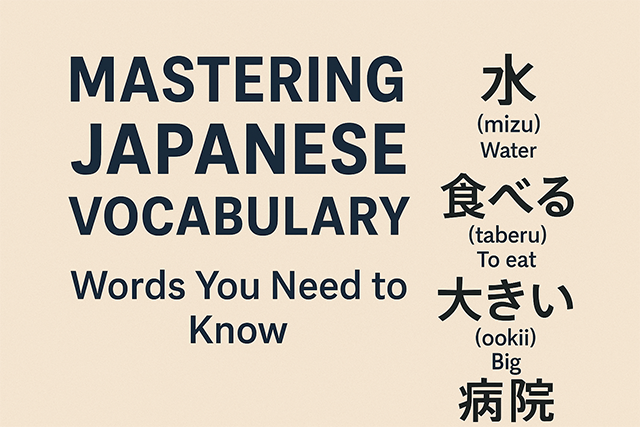The Japanese Vocabulary Journey: From Struggling to Thriving
Remember that moment when you first heard someone speaking fluent Japanese? Maybe it was in an anime, or perhaps you met a Japanese speaker in person. That feeling of “I wish I could understand what they’re saying” is exactly where most of us start.
Learning Japanese vocabulary can feel like climbing Mount Fuji – intimidating at first, but incredibly rewarding once you start making progress. I’ve been there, staring at flashcards at 2 AM, wondering if I’ll ever remember the difference between 食べる and 飲む. But here’s the thing: every Japanese learner has felt that way, and we’ve all found our own paths to success.
Why Your Vocabulary Actually Matters (More Than You Think)
Let me share something that changed my perspective completely. I spent months studying grammar rules and conjugations, but when I finally tried watching Japanese Netflix without subtitles, I was lost. That’s when it hit me – you can know all the grammar in the world, but without vocabulary, you’re essentially trying to build a house without bricks.
Think about it this way: vocabulary is what transforms you from someone who can say “I go to…” to someone who can actually express where you’re going, why you’re going, and how you feel about it. It’s the difference between tourist-level communication and actually connecting with people.
When you build a solid vocabulary foundation, suddenly:
- Those anime conversations start making sense (goodbye, subtitle dependency!)
- You can actually participate in real conversations instead of just nodding politely
- JLPT exams become challenging but manageable, not impossible mountains to climb
- Traveling in Japan becomes an adventure, not a series of pointing and gesturing sessions
The Words That Will Change Your Japanese Game
Start Here: Your Daily Survival Kit
These aren’t just “beginner words” – they’re your lifeline in Japan. I learned this the hard way during my first week in Tokyo when I couldn’t even ask for water properly.
Essential Greetings & Basics:
- こんにちは (konnichiwa) – Hello (but you probably knew this one!)
- すみません (sumimasen) – Excuse me/Sorry (seriously, you’ll use this 50 times a day)
- ありがとうございます (arigatou gozaimasu) – Thank you (politeness goes a long way)
- はい/いいえ (hai/iie) – Yes/No (simple but crucial)
- わかりません (wakarimasen) – I don’t understand (your most honest friend)
Food & Survival:
- ごはん (gohan) – Rice/Meal (rice is life in Japan)
- 水 (mizu) – Water (you’ll need this, trust me)
- お金 (okane) – Money (because let’s be practical)
- トイレ (toire) – Toilet (no explanation needed)
Verbs That Actually Matter
Stop trying to memorize every verb in the dictionary. Focus on these workhorses first:
- 食べる (taberu) – To eat (you’ll use this daily)
- 飲む (nomu) – To drink (pairs perfectly with the above)
- 行く (iku) – To go (half of your conversations will involve going somewhere)
- 来る (kuru) – To come (the other half will be about coming from somewhere)
- 見る (miru) – To see/watch (for all those “Did you see…?” moments)
- する (suru) – To do (the Swiss Army knife of Japanese verbs)
- 買う (kau) – To buy (essential for any shopping adventure)
Descriptive Words That Add Color
These adjectives will help you move beyond basic communication:
- 大きい (ookii) – Big (for when “small” ramen just won’t cut it)
- 小さい (chiisai) – Small (perfect for describing cramped Tokyo apartments)
- おいしい (oishii) – Delicious (your key to making Japanese friends through food compliments)
- 高い (takai) – Expensive/Tall (because Tokyo prices will shock you)
- 安い (yasui) – Cheap (your best friend when budget traveling)
The Real Talk: How to Actually Remember These Words
Stop Fighting Your Brain – Work With It
Here’s what nobody tells you about vocabulary learning: your brain isn’t designed to remember random word lists. It’s designed to remember stories, emotions, and experiences. So let’s use that.
The Context Method (My Personal Game-Changer): Instead of memorizing “eki = station,” create a mini-story: “I’m rushing to catch the train at the eki, and I can hear the announcement echoing through the building.” Suddenly, you’re not just remembering a word – you’re remembering an experience.
Spaced Repetition (But Make It Human): Yes, use Anki or similar apps, but don’t become a robot. When a card comes up, don’t just flip it – pause for a second and try to use it in a sentence about your actual life. “今日、駅で友達に会いました” becomes more memorable than just “eki = station.”
The Immersion Trick (Without Moving to Japan): Change your phone’s language to Japanese for common apps. Start with something low-stakes like your weather app. You’ll learn words like 雨 (ame – rain) and 晴れ (hare – sunny) naturally because you actually need to know if it’s going to rain tomorrow.
Group Learning That Actually Works
Instead of random vocabulary lists, organize words around real situations you’ll encounter:
At a Restaurant:
- メニュー (menyuu) – Menu
- 注文 (chuumon) – Order
- おすすめ (osusume) – Recommendation
- お会計 (okaikei) – Bill
Getting Around:
- 地図 (chizu) – Map
- 道 (michi) – Road/Way
- 迷子 (maigo) – Lost (you’ll need this one)
- 電車 (densha) – Train
Tools That Won’t Let You Down
Let me save you some time and recommend tools that actually work:
For Systematic Learning:
- WaniKani – If you’re serious about kanji and vocabulary, this is worth every penny
- Anki – Free, customizable, and powerful (but requires setup time)
For Natural Exposure:
- NHK Easy News – Real news, simplified Japanese
- JapanesePod101 – Great for hearing vocabulary in context
- Netflix with Japanese subtitles – Turn those binge sessions into study time
For JLPT Prep:
- JLPT Sensei – Clear level-based vocabulary lists
- JLPT In Nepali App – Especially helpful if you’re a Nepali speaker
The Marathon Mindset
Here’s the truth nobody wants to hear: there’s no hack for vocabulary learning. It’s not about finding the perfect app or the magic method. It’s about showing up consistently, even when you don’t feel like it.
Some days you’ll feel like a genius, understanding everything in your Japanese drama. Other days, you’ll forget the word for “water” and question all your life choices. Both days are normal and necessary parts of the journey.
What matters is that tomorrow, you show up again. Maybe you learn five new words, maybe you just review old ones. Maybe you just listen to a Japanese song and catch one familiar word. All of that counts.
Your Next Steps (Starting Today)
Don’t wait for Monday or next month. Pick five words from this post that you don’t know yet. Write them down. Use them in sentences about your actual life. Review them tomorrow.
That’s it. That’s how vocabulary mastery begins – not with perfect study plans or expensive courses, but with curiosity and consistency.
Remember: every fluent Japanese speaker started exactly where you are now, wondering if they’d ever understand this beautiful, complex language. The difference between those who made it and those who didn’t isn’t talent – it’s persistence.
Your Japanese vocabulary journey starts with a single word. Why not let it start today?

